|
Hi Steve, thanks for talking
to me today. Looking forward to the Swansea date. How are you feeling
about the tour?
I feel very good about it! I'm still rehearsing myself, to get it all
into the grey cells, you know. Once I have, that'll be great. We're
still touring, doing Seconds Out, so I've been between 3 or 4 different
albums this year - Selling England By The Pound, Seconds Out, and now
Foxtrot - all those Genesis albums, plus the solo stuff as well, so
it's been a busy year. Ever since last autumn, we've been touring bascially
nonstop.
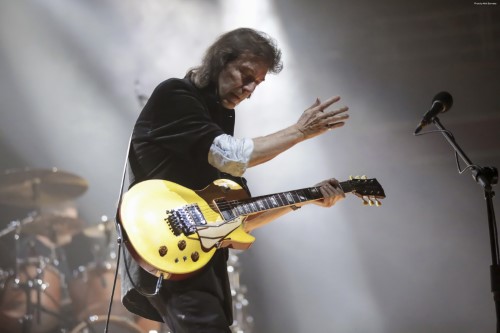
Great, so Foxtrot is the upcoming one, isn't it?
Yeah, that's right, Foxtrot - which is 50 years old this year. We're
just coming, at the close of this year - to a mere 50 years ago, yeah!
So it's a lot of mental gymnastics to do then, I suppose.
Yeah, that's right. It's a lot to remember, but I'm doing some of those
numbers...I've done Supper's Ready live so many times now, it always
presents its challenges, but it's a great number to do live, and I'm
looking forward to doing 'Watcher of the Skies', and funnily enough,
there's a little number called 'Time Table', which sounds very pretty.
I'm hoping that it's gonna work in a live context, cause I don't know
any band that's done it live, we didn't do it with Genesis back in the
day. It's got a slightly, sort of...Genesis meets Beatles, in a way.
It's kind of nice in its quaintness, really.
That's great - it's a funny little song, and it's nice to find ways
into the ones that have been overlooked slightly, I think.
Exactly yeah - that's been overlooked, it's a Cinderella song, it's
never been to the ball and now it's going to.
An ugly-duckling song.
Yeah, exactly, that's right.
So it's been quite an epic career for you, and a very long time since
those classic albums were originally recorded, so I was just wondering
how you look back on them from today's perspective - are you nostalgic,
or do you see it in a more pragmatic sense? Does it bring back any particular
memories or associations, even mundane ones?
Well, it's strange - some songs sound sweeter with the passing of time.
We were talking about 'Time Table', that's one of those - and funnily
enough, I've just rehearsed that yesterday, and today I've moved on
to Get 'Em Out By Friday, and I thought, in a way, it's interesting
- I remember when we were recording that, Donovan wandered in to the
studio, and I started talking to him and thinking I'd spent a lot of
time listening to his stuff in the 1960s, and here were we, a young
band at the beginning of the 1970s, doing our stuff, and we were just
doing the bit that was "real flute meets Mellotron flute"
- the cascading canon-like section, and I was listening to that today,
trying to remember the chord changes, and thinking that it really is
a very good little song.
There's a pal of ours, who's a DJ in Norfolk, and he said that he'd
heard an interview that John Lennon gave where he was saying that there
were two bands that were true sons of the Beatles, and one of them was
ELO and the other one was Genesis. He used to get all the albums sent
to him in New York, from Nursery Cryme onwards. Now, Nursery Cryme is
where I got on board with Genesis - with Phil Collins, of course - that's
Phil's first album with Genesis. So whenever I listen to this stuff
back, I think 'ah yes, of course there was an influence here, of course
- I'm doing Beatles piano on guitar, I'm doing something deliberately
simple, trying to be prosaic, in order to push it and change it in another
way...you know, guitars sounding like pianos, or keyboards sounding
like guitars...which was part of what Genesis did.
And I'm allowed to think about that now - we just got on with the job
back in the day, and it wasn't part of history, it was just..."here's
the new album". But I did have lots of very happy memories of that
stuff, and I like the remix of that particularly, cause it makes the
guitar sound more jangly, and it's more how I remember it when I did
it in rehearsal, with an upright piano and not too many frills - it's
not an epic song that one, 'Time Table'. Me trying to be George Harrison,
I think.
I was wondering what you thought of the slight "pop" elements
of it all, because to me the best of progressive or what you might call
"prog" rock is always very melodic and always hooky, which
I think your guitar really added to the band in those days. There was
a great sense of melody that you brought to it.
Yeah, funny that, isn't it. I was gonna leave the band before Foxtrot,
cause I thought that we ought to part ways, as I didn't get the feeling
that I was being particualrly encouraged within the band. I remember
Tony and Mike said 'no, we really like your playing and we want you
to stay with us, and I thought, oh, they like what I do - alright then,
I will stay', and I stayed for the next five years, at least. So isn't
it funny the way those things work - in fact, I think Ringo Starr said
the same thing about The Beatles, he was going to leave, until Lennon-McCartney
said, 'no, we like your drumming, we want you to stay'. You know, you
can be in your own world with this stuff, but musicians do need a bit
of a pat on the head - they need permission to be their full selves,
perhaps.
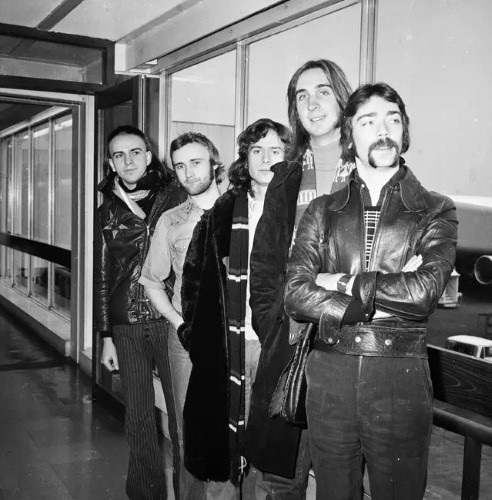
Well, there were a lot of big personalities in the band at that time.
So, I was wondering if you could talk about the collaborative process
of writing those songs at that times.
Well, when I joined them, the band didn't possess a Mellotron or a synthesizer,
or a light show. I was dead keen that we should get all of those things,
first of all, starting with the Mellotron. Then I knew we needed a light
show, you know. So, part and parcel of that is meeting Robert Fripp
for the first time, who was selling a Mellotron, because King Crimson
had Mellotrons to spare at that point, so they were offloading one of
them - the Mark 2. The same thing that made the sound on Strawberry
Fields Forever - you know, the introduction, the Mellotron flutes.
So, straight away, we met him and Tony started mixing together - in
King Crimson's rehearsal space - the strings and brass together, and
started making the kind of sound that became 'Watcher of the Skies',
so for the next album it was gonna be 'Watcher of the Skies', so he
was using Mellotron brass and strings, with an almost sort of Disney-esque
aspect to it, the orchestra almost being like a cartoon compared to
the real thing. So, I remember 'Watcher of the Skies' being rehearsed
in embryo form, in Palasport in Italy. So we were a sufficiently big
band to be playing these arenas in Italy, whilst we were still doing
clubs elsewhere, and it really did sound great in those big places.
The grandiosity of the sound was only served by the extra acoustics
- the excess of reverb, like a Paddington-Station ambience. Places that
weren't designed for concerts at all - they were designed as sports
arenas, but there was quite some ring on the place, and the Mellotron
could shake the foundations.
So I remember that and how excited the Italians were, who were putting
on our first shows and saying 'oh, that number's really exciting, isn't
it - we had the crescendo at the beginning - the feeling of something
momentous about to happen seemed to be dead right for the Italians!
In fact, we were halfway through recording the album and I still had
to finish off my guitar overdubs, so I remember flying back from one
of the Italian gigs to put the finishing touches to 'Supper's Ready',
for instance, whilst the others were traveling back by road, with no
sleep. It just worked out that way - I wasn't trying to blag extra comfort
for myself! But I remember that 'Supper's Ready' was put together at
the Una Billings School of Dance, in Shepherds Bush. I remember us writing
that in...two weeks. So that was half the album written in two weeks,
plus a solo piece from me, 'Horizons', which had taken about a year
for me to put together, cause I kept chipping away at the block of that
and coming up with other things - 12-string parts for the earlier part
of 'Supper's Ready'.
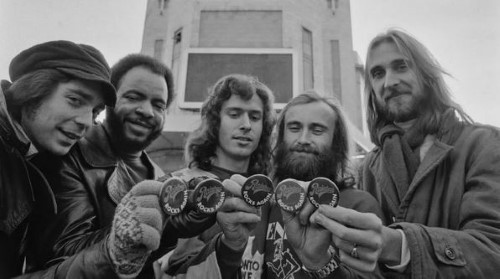
There were songs that were written by individuals, and there were parts
that were written by individuals. I remember coming up with 'Can-Utility
and the Coastliners', the song and the lyric for the early part of the
tune. I think I was trying to write something in a Genesis "style"
- in those days, if you wanted to get people on board with an idea,
you had to form alliances. So, I started working out 12-string parts
for that with Mike Rutherford. That went very well, so we were able
to present something as a duo, and luckily Pete liked the lyrics enough
to do it, and took his actor's approach to it.
I think the early Pete, at this time, was part Richard Harris, part
all sorts of things...he had an actor's declamatory way of putting things
across. Borrowing from theatre, and pantomime. He wasn't a straight-ahead
singer at that time, and it was great that he started to personify the
lyrics, which coincided with the arrival of our first light shows. So,
because our presentation had taken leaps and bounds forward, the response
of the band was met with an equal enthusiasm - an enthusiasm that hadn't
been there before.
When you do these long-form things and they've got quiet passages, they
really do need an accompanying visual, and ideally a spellbinding lead
singer to be able to maintain people's interest. Or else, when you're
playing at the students union, at a college somewhere, people will just
wander off to the bar. It all changed when we had these visuals and
were using backlight, and white muslin backdrop, and various other things.
In combination with the other lights, that started to go slightly infrared
and unreal. That was very nice, to know that the band was looking and
sounding good at that time.
They must be amazing memories to have. And I'm just wondering - jumping
forward in time, if you could just talk a bit about your current band,
who the musicians are, and the challenges of trying to recreate, or
reinvent, these songs?
I'm anxious not to approach it like a tribute band - I don't want it
to look exactly the same, or even sound exactly the same - I want the
versions to be authentic. And they are - so you get the grandiosity
and all of that, but hopefully, you can give it a wider frame than it
had originally. Lights have come on enormously since then - not just
the moving lights that we use, but to be able to create shapes with
lights - there's some new technology that we'll be using with this,
and some slow-mo effects that I think are very good. So I'm really looking
forward to doing that. It's beautiful material.
The guys in the band are; Rob Townsend - who's basically a multi-instrumentalist,
doing brass and woodwind, extra keyboard duties and percussion stuff
- terrific character, amazing virtuoso jazz professor. Roger King, who
is an amazing keyboard player, who's done film music, as well as other
things - he's worked on Hollywood movies and trained as a cathedral
organist. Incredible engineer/producer as well. Nad Sylvan, who's Swedish-American,
very tall and blonde, adds great voice and does great impressions of
Peter Gabriel and Phil Collins. On the other side of the stage, we have
Jonas Reingold on bass and 12-string stuff, and Craig Blundell on drums,
who's everybody's favourite drummer at the moment.
They are an extraordinary team, and occasionally we're joined by Amanda
Lehmann. She tends to join for the solo stuff, but funnily enough, when
we do 'Shadow of the Hierophant', we do the full-length version. Now
that stuff was rehearsed by Genesis at the same time as Foxtrot, so
it was one of the Foxtrot rejects. And after I did it, the guys were
all very taken with it and said 'oh, this could have been used for Genesis,
couldn't it?' So we had part of the Genesis team on that solo album
- 3 out of 4 of the Genesis guys at that point in time. All very happy
memories, all of that - so I'm looking forward to it.
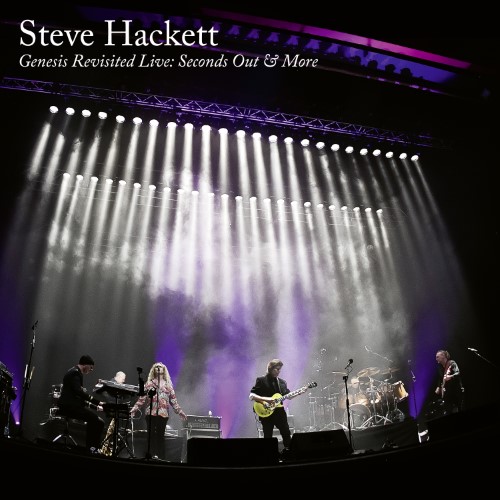
That's great. I'm also wondering if you can just tell me a bit about
the equipment you're currently using - guitar, amp and effects - I think
you're known for playing mostly Les Pauls on the lead side of it, weren't
you, back in the day, apart from the 12-string or acoustic parts? So
I wonder if you can talk a bit about that - and the effects and amplification
side of it, as well?
Live, I tend to use a Fernandez, which is Les Paul-shaped but it's got
the sustainer pickup in it, and a tremolo arm as well. I've been using
those for quite some years, and the one I use most of the time once
belonged to Gary Moore. I used to use that live as a spare, because
he and I shared the same guitar tech at one point, Graham Lilley.
When Gary passed on, Graham said to me 'I've been asked to sell off
the family silver, as it were - are you interested in this guitar, and
maybe one or two of his others?' So I did buy a couple, and that guitar
has got history, the one I'm playing live, and it's an amazing thing.
I'm also playing - in rehearsals - a guitar that was invented by Brian
May and his father, and that sounds amazing. Talk about amazing guitarists,
Brian May and Gary Moore.
So there's that kind of link - the music links us, and the guitars -
one moment you're thinking it's sounding like this guy, the next like
that guy. So I'm very happy to be doing that, I hope to be able to use
the Brian one for some things live, even if it's just coming out and
playing a few notes on it, unaccompanied, right at the beginning of
the set. It's an amazing-sounding beast.
That would be a nice tribute as well, wouldn't it.
Exactly - I do revere these people. We're all human, of course. For
as long as we're here on this planet, making extraordinary noises -
that's what it's all about.
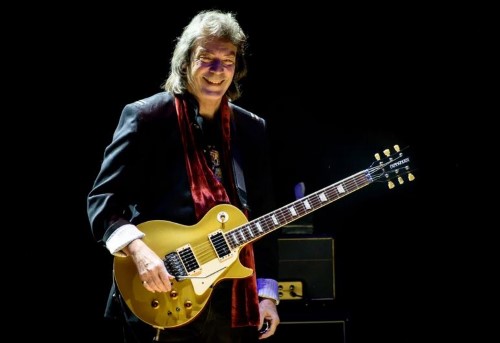
You've probably had this question a lot, but I wanted to ask you
about tapping on the guitar neck - people do often say that it was you
that invented it, so I wonder what your position on that is? And how
did you initially come up with that?
Well, I used it live with Genesis in 1971 in the first year that I joined
them, and I was originally trying to play a line from 'Toccata and Fugue',
the Bach piece, and I figured the easiest way to do it was to do it
on one string, to be able to get the jumps. Then I figured I could use
it in a guitar solo on 'Musical Box', so I was using it then. I believe
I'm the first person to do it on electric guitar, but I'm told that
there was somebody who was doing that on a nylon guitar in the 1960s,
so I don't really know to be honest.
I know that Eddie Van Halen said he credits me with having invented
it - another amazing guitarist who's passed on now. I just know that
that technique enables anyone to be the fastest gun in the West because
you're not having to synchronise the plectrum stroke with what the finger
is doing, so once you eliminate that, you've got bullets flying everywhere,
really. It is a way of firing off guitar salvos - but nobody gets hurt.
So I think it's ok to be a guitar gunner...it's alright.
That's the best kind, isn't it?
The best kind of gunner, yeah.
As Woody Guthrie pointed out, originally.
Something like that, yes - was his 'this machine kills', or?
'This machine kills fascists', that was the one.
Can you remember the original
moment when you actually started the tapping?
I do remember - it was in my bedroom at home, when I was living with
my folks in Pimlico. I was just using my nail to hammer-on and hammer-off,
so once I realised I could do that in time - of course, you can't do
it in time when you first do it, you've got to space out your approach
- and I realised the sky was the limit, in terms of how fast you could
play on one string, and then if you could jump strings, you were doing
even better. On a good day, I can do that. But it is a fabulous technique.
Very freeing.
It's the sort of thing - funnily enough, with Genesis, what we did often,
with Tony - who was a keyboard player who was often trying to sound
like a guitarist, while I was a guitarist often trying to sound like
a keyboard player - we did things in harmony. So I'd be tapping, and
he'd be doing something on a Hohner Pianet put through a fuzz-box. That
was the kind of gear he was using at the time - I was using a Duo Fuzz
back in the day, but I tend to use Line Six or a Sansamp for my distortion
these days. At home, I've been using a Metal Zone pedal, funnily enough,
which is very peaky, lots of upper harmonics, particularly with the
Brian Red Special copy that I've got.
When I think of those early Genesis albums, I can't imagine it without
your guitar sound and those extended techniques, the sweep-picking on
'Dancing With the Moonlit Knight' as well, is such a precious and transportive
part of that music. I play lead guitar as well, so when I was a teenager
that was one of my favourites.
Oh right, you're a guitarist. It's interesting that, isn't it - you
do something, and it's a throwaway idea, and if you're lucky, these
things can become part of the glossary of terms. I think sweep picking
is quite hard to articulate when you've got distortion, because you're
having to mute at the same time to make that work. Sweep picking in
a way, is sort of in line with what nylon players do - flamenco players
can employ different techniques with the right hand, if you're a right-handed
player. Your left hand is doing stuff on the fretboard, but what are
you doing with the other hand? So I tend to use my nail a lot.
If I'm playing electric, I tend to use my nail on my forefinger, and
augment with my other nails, if I need them. I keep my nails in shape.
They can get a little in the way while you're doing tapping of course,
so I use the flat of the nail, and that comes very naturally to me,
but as far as I know, I'm the only person who does that. I haven't seen
other players who feel comfortable with doing that. I think Jeff Beck
uses the side of a plectrum, and I can understand that.
I have that thing about wanting to be in close contact with the strings,
as much as possible, so you're shaving off nanoseconds, here, with that
kind of behaviour. But that's a good one - and octave jumps, as well.
The old-fashioned way, or - you were talking about the solo on 'Moonlit
Knight', that was a case of just stomping on an octave divider, on and
off, and I do the same thing with a POG these days - but it's quite
a tap-dance, all of that, isn't it.
I love the way you've managed to bring in the extended techniques,
but you've made them very musical and very much part of the musical
world you're trying to create.
Well, in the old days, I used to get very excited about a fuzz-box -
something like the Duo Fuzz had all this upper harmonic in it, and I
used that with a Coloursound Tonebender, and I would use them in series.
That provided quite a lot of the sound that was on Voyage of the Acolyte,
and stuff that was on Lamb Lies Down. Peter Gabriel said to me 'oh,
it sounds a bit like a harmonica', which was ironic, of course, as it
had all this upper harmonic in it.
So I'd fade in the notes like that. It could sound very powerful, but
you had to use it at low wattage, because if you played it too loud,
it would just feedback like crazy. Of course, it would give you a great
sustain, but then the end of the note would die horribly. But then the
E-Bow gave us sustain. I'll be back on the Les Paul doing that - Les
Paul with an E-Bow. That'll be interesting, going back to that.
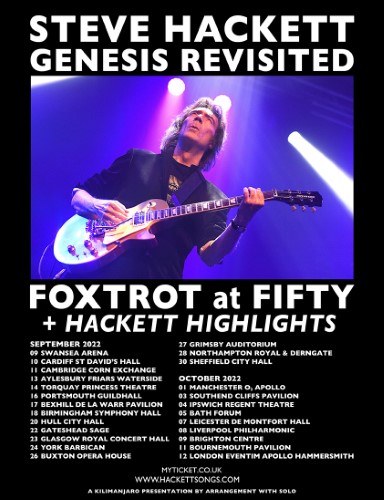
Well, great.
I think I've got everything I need, so thanks very much for doing this.
So best of luck with the tour, and it was a pleasure!
Best of luck with your own playing, as well!
Thanks very much, I'm just self-releasing some albums at the moment
(listen here).
I did have a band, but it broke up- so I've taken matters into my own
hands.
Well, you know - as the I Ching says, 'work on that which has been spoiled',
so any ideas that you've had at one point can be re-employed somewhere
else, and as Roger Dean says - quoting the I Ching again - 'perseverance
furthers'. So there's a couple of good lines from that book. Very encouraging
for those who think they might throw in the towel and say 'oh, my ruined
masterpiece!', but you can present and re-present the same ideas.
I think I'm constitutionally unable to give up, anyway, to be honest.
Oh, I'm glad to hear that! Very good, yes. Don't let the internal invalidator
get to you - put it to one side.
Steve Hackett plays Swansea arena Sept 9th 2022 as part
of his Genesis Revisited: Foxtrot at Fifty Tour
His new live album Seconds Out will be released Sept
2nd 2022
Tom Emlyn
|






